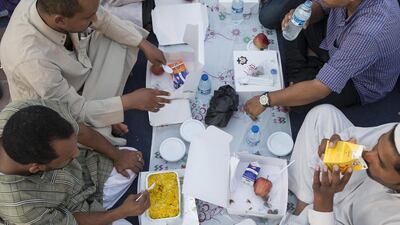A few minutes before the end of fasting, the strain on the faces of the Mina Zayed fish market workers was evident.
My friend and I were seated alongside them in a restaurant near the market and as the time of the Maghrib prayer neared, the waiters began bringing out jugs of juice and plates heaped with food ready for the workers to slake their thirst and hunger.
What happened next was truly humbling.
Two men from Kerala sitting beside us gestured towards the food.
“Go ahead,” they said, correctly assuming that the pair of westerners weren’t bound by the religious commitment to fast.
We were welcome to start the meal now. We didn’t take up the offer, of course, and waited to break our fasts together. But while this incident was humbling, it was by no means surprising.
It’s no secret that Ramadan is a testing month. Experiencing temporary deprivation is designed to enhance our appreciation of the abundance and blessings with which the vast majority of us live our lives.
Despite this country’s generous concessions designed to lessen the burden on those like me who don’t follow this central tenet of faith, the reality is this is a difficult month for everyone.
It’s little wonder that many non-Muslims choose Ramadan to travel to places that don’t practice it. When I first arrived in Abu Dhabi I probably expected to do so too.
But as Ramadan rolled round, I found myself interviewing a young Emirati about the experience of having spent the previous holy month studying in Australia, where nearly everyone else ate and drank around him.
He offered a glass of juice for me to drink while I interviewed him in his home in Khalifa City. He couldn’t eat or drink during daylight hours, he explained, but I was his guest and as a non-Muslim, I was welcome to drink in front of him.
This sort of thing happened time and time again.
A Muslim friend organised an iftar in the dunes off the Dubai-Madam Road two years ago to raise money for charity and as the Maghrib prayer neared, I stood back from the tables heaped with food because unlike most of those around me, I had not been fasting.
Within seconds, a stranger to one side had pushed me forward, saying: “You're our guest so you're the priority."
All this helped explain why I was at the Mina Zayed restaurant last year.
An Emirati friend had let a group of my friends stay at his air-conditioned farmhouse near Hatta in Ramadan last year after we’d gone canyoning nearby.
Instead of buying him a gift to say thanks, we had raised about Dh1,200 with the goal to pay back his hospitality by paying it forward: buying iftar meals in his name for low-paid workers in Abu Dhabi.
This proved to be a rather more difficult task than we expected.
We wanted to target those with modest budgets, so each night my friend and I would go to low-cost restaurants, join those who assembled to await the Maghrib prayer and then while they broke their fasts, we would quietly go up to the cashier to pay their bills.
But even doing this night after night did not make much of a dent in our funds. And in some restaurants, we would go up to pay, only to discover someone else had beaten us to it by having sponsored a night of iftar meals.
Even when we had the chance to pay, such as at Mina Zayed, almost always we were the ones who were left humbled by the generosity of spirit we encountered.
jhenzell@thenational.ae

